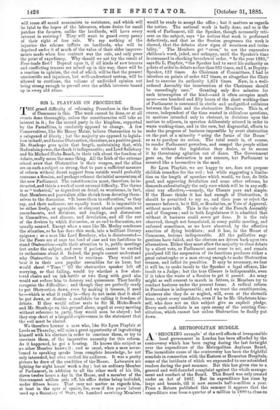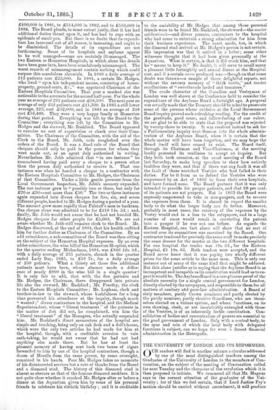A METROPOLITAN MUDDLE.
'SHOCKING example' of the evil effects of irresponsible LL local government in London has been afforded by the controversy which has been raging during the last fortnight over the expenditure of the Metropolitan Asylums Board. The immediate cause of the controversy has been the frightful scandals in connection with the Eastern or Homerton Hospitals, some of the incidents of which we expounded to our astonished readers during the past summer. But this has given rise to a general and well-founded complaint against the whole manage- ment and conduct of the Board. This Board was only created under an Act of 1867. But its expenditure has risen by leaps and bounds, till it now exceeds half-a-million a year. From a Return 'published this summer it appears that the expenditure rose from a quarter of a million in 1880 to close on £400,000 in 1881, to £514,000 in 1882, and to £550,000 in 1884. The Board pleads, to some extent justly, that it has had additional duties thrust upon it, and has had to cope with an epidemic of small-pox. But there is no doubt that its expendi- ture has increased out of all reason, is increasing, and ought to be diminished. The details of its expenditure are not forthcoming. Some of its hospitals and asylums appear to be well managed—some are cestainly ill-managed. The two Eastern or Homerton Hospitals, in which alone the details have been gone into, have been scandalously mismanaged. The worst records of mismanagement contain nothing which could surpass this scandalous chronicle. In 1880 a daily average of 213 patients cost £23,000. In 1881, a certain Mr. Hodges, who lived "upon his independent means, consisting of house- property, ground-rents, &c.," was appointed Chairman of the Eastern Hospitals Committee. That year a marked rise was noticeable in the accounts for the second half-year. For the whole year an average of 291 patients cost £38,500. The next year an average of only 232 patients cost £41,300. In 1883 a still lower average, 223, cost £52,000, and in 1884 an average of 268 cost £56,460. They were a very happy family at Homerton during that period. Everything was left by the Board to the Committee ; everything was left by the Committee to Mr. Hodges and the steward, Mr. Bashford. The Board appeared to exercise no sort of supervision or check over their Com- mittee. The Chairman of the Committee, with the aid of the Clerk to the Board, Mr. Jebb, rode roughshod over the orders of the Board. It was a fixed rule of the Board that cheques should only be paid to the person for whom they were made out, or an agent duly authorised in writing. Nevertheless, Mr. Jebb admitted that "in one instance" he remembered having paid away a cheque to a person other than the person duly authorised to receive it. That one instance was when he handed a cheque to a contractor with the Eastern Hospitals Committee to Mr. Hodges, the Chairman of that Committee. Under a little gentle pressure from the Local Government Inspectors, Mr. Jebb's memory expanded. The one instance grew to "possibly two or three, but only for £20 or £30—not more than £50." The two or three instances again expanded into divers cheques for five, six, and seven different people, handed to Mr. Hodges during a period of a year. The amount grew more rapidly than Falstaff's men in buckram. One cheque alone was admitted to be for £418 14s. 5d. ; and, finally, Mr. Jebb would not swear that he had not handed Mr. Hodges cheques for other people for £5,000. We are not aware whether Mr. Jebb still remains clerk to the Board. Mr. Hodges discovered, at the end of 1884, that his health unfitted him for further duties as Chairman of the Committee. By an odd coincidence, a sub-committee of the Board was then sitting on the subject of the Homerton Hospital expenses. By an even odder coincidence, the wine bill of the Homerton Hcspital, which for the quarter ending Michaelmas, 1884, was £846 12s. 9d., with a daily average of 235 patients, shrunk in the quarter ended Lady Day, 1885, to £52 7s., for a daily average of 230 patients. What a thirsty set those five additional patients must have been, whose absence made a differ- ence of nearly £800 in the wine bill in a single quarter ! It is only fair to add, that with the five patients and Mr. Hodges, the Chairman, there disappeared into private life also the steward, Mr. Bashford ; Mr. Freethy, the clerk to the Eastern Hospitals Committee ; Mr. Lapham, clerk and brother-in-law to the steward, whose bashfulness for a long time prevented his attendance at the inquiry, though much "wanted ;" divers contractors to the hospital, and the Medical Superintendent, whose "liberal treatment" of the patients in the matter of diet did not, he complained, win him the "liberal treatment" of the Managers, who actually suspended him. Mr. Bashford's direct mementoes of the hospital are simple and touching, being only an oak desk and a doll's house, which were the only two articles he had made for him at the hospital, though, with a creditable aversion to vain oath-taking, he would not swear that he had not had anything else made there. But he has at least the pleasant memory of having sent back two boxes of cigars forwarded to him by one of the hospital contractors, though a dozen of Moselle from the same person, by some oversight, remained in his hands. Poor Mr. Hodges takes no memento of his disinterested services but a vote of thanks from the Board and a diamond stud. The history of this diamond stud is almost as obscure as that of the famous diamond necklace. It is not quite clear whether it reached Mr. Hodges after or before a dinner at the Aquarium given him by some of his personal friends to celebrate his sixtieth birthday; and it is creditable to the amiability of Mr. Hodges that among those personal friends were to be found Mr. Bashford, the steward—the auctor celebrationis—and divers persons, contractors to the hospital who had come to entertain a strong admiration for him from their business experience. The exact mode, too, in which the diamond stud arrived at Mr. Hodges's person is not certain. His impression was that it arrived in a letter; some other witnesses thought that it had been given personally at the Aquarium. What is certain, is that it did reach him, and that he "means to keep it." No doubt, it will serve to recall many a pleasant little fortnightly and annual dinner at the Hospital cost, and if a certain menu produced was—though on that some doubt was thrown—a sample of those delightful repasts, not without the savoury memory of "thick turtle," and tender recollections of "sweetbreads larded and tomatoes."
The crude character of the Guardian and Vestryman of London was well shown at the Conference held to consider the expenditure of the Asylums Board a fortnight ago. A proposal was actually made that the Treasury should be asked to prosecute some of the persons whose evidence at the Local Government Board inquiry proved such refreshing reading. For the credit of the gratitude, good sense, and fellow-feeling of our rulers, we are glad to be able to state that the proposal was rejected by twenty-three to twenty. It was resolved instead to ask for a Parliamentary inquiry next Session into the whole adminis- tration of the Asylums Board, when it is certain that the whole matter will have been forgotten, and we may hope the Board itself will have ceased to exist. The Board itself, through its Chairman and Vice-Chairman, at the meeting loudly protested its readiness to accept an inquiry. But they both took occasion, at the usual meeting of the Board last Saturday, to make long speeches to show how entirely faultless they were, and that if there was any fault it was all the fault of those wretched Vestries who had failed in their duties. Far be it from us to defend the Vestries who were empowered by an Act of 1866 to form their own hospitals, and have formed none. The Board protests that it was only intended to provide for pauper patients, and that 90 per cent. of its patients are not paupers. But in 1869 the Board were expressly empowered to take in non-paupers, and to recover the expenses from them. It is absurd to expect the smaller body to do what the larger body can do better. Moreover, probably in most cases, the recovery of the expenses by the Vestry would end in a loss to the ratepayers, and in a large number of cases would result in converting the patient into a pauper if he was not one before. As regards the Eastern Hospital, one fact alone will show that no sort of control over its committees was exercised by the Board. One contractor tendered for precisely the same stuff to make precisely the same dresser for the master at the two different hospitals. For one hospital the tender was 19s. dd., for the Eastern Hospital, £1 19s. 6d. Both tenders were accepted, and the Board never knew that it was paying two wholly different prices for the same article to the same man. This is only one instance out of many of the same kind that might be adduced. But this alone justifies us in saying that the Asylums Board is as incompetent and incapable as its constitution would lead us to ex- pect it would be. The AsylumsBoard is a conspicuous proof of the absolute necessity for a single central government for London, directly elected by the ratepayers, and responsible to them for all matters of sanitary and poor-law administration. A Board of sixty members, partly Crown nominees and partly elected by the partly nominee, partly elective Guardians, who are them- selves elected on a vicious system, and whose functions, on its own showing, clash, or are inextricably entangled with those of the Vestries, is of an inherently feeble constitution. Con- solidation of bodies and concentration of powers are essential to the good government of London. Only with a central body, to the spur and rein of which the local body with delegated functions is subject, can we hope for even a decent financial administration in the Metropolis.







































 Previous page
Previous page